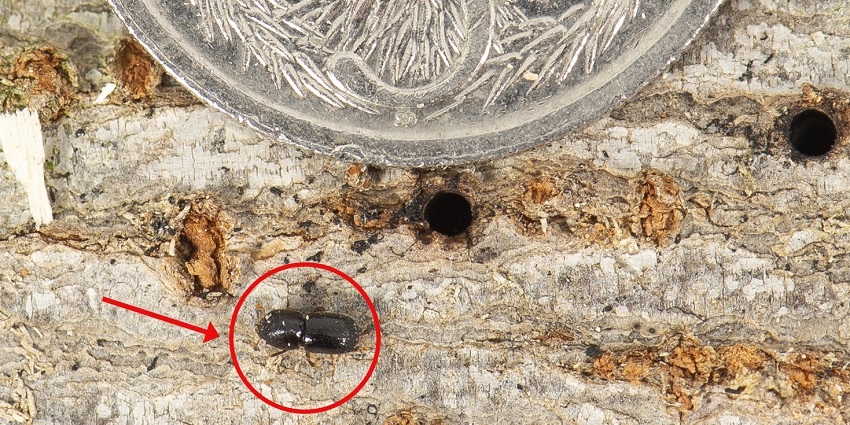
Communities from Geraldton to Esperance are asked to check their trees and shrubs for any signs of an exotic beetle to make sure it has not made its way into the regions.
The Department of Primary Industries and Regional Development (DPIRD) confirmed the detection of the Polyphagous Shot-Hole Borer (PSHB) in a backyard maple tree in East Fremantle earlier this year.
In an effort to determine how far the pest may have spread, the department is implementing a surveillance program in the Mid West, Wheatbelt, South West and Great Southern.
Department Chief Plant Biosecurity Officer Sonya Broughton said although the borer and its larvae would be hard to spot, as it spent most of its life inside a tree, there were a number of symptoms to look out for.
“These include multiple entrance holes on the trunk or branches that are about the size of a ballpoint pen tip, crystalline foam (sugar volcanoes) exuding from the entry holes and tree wilting or dieback,” Dr Broughton said.
“The top five trees to check are maple, willow, plane, coral tree and avocado as these are considered reproductive hosts in which both the beetle and the fungus establish and reproduce.”
The tiny PSHB is exotic to Australia and considered both an agricultural and environmental pest, due to its wide range of host species.
“If established, the borer would have a significant impact on amenity trees and the fruit, nut, nursery and garden industries,” Dr Broughton said.
“The borer can spread by flying up to 400 metres to neighbouring trees or by the movement of infested firewood, plants and green waste material, which is why we are expanding our surveillance program to regional communities.
“If residents do find something usual, we ask them not to remove it from their properties, and instead take photos and report to DPIRD.”
A Quarantine Area Notice (QAN) is in place for 17 local government areas in the metropolitan area, including Cambridge, Canning, Claremont, Cockburn, Cottesloe, East Fremantle, Fremantle, Melville, Mosman Park, Nedlands, Peppermint Grove, Perth, South Perth, Stirling, Subiaco, Victoria Park and Vincent.
This means residents within the Quarantine Area cannot move any wood or plant material outside of this area that could host the borer.
Dr Broughton said a key message for regional residents who are having visitors from inside the metropolitan Quarantine Area this holiday season are to remind their guests they cannot bring any wood or plant material that could host the borer from their homes to yours when visiting. This includes live plants with stems greater than 2cm diameter as they can host the borer.
Residents are asked to report anything usual to the department via the MyPestGuide® Reporter app or to the Pest and Disease Information Service on 9368 3080, email mailto:padis@dpird.wa.gov.au
For more information on PSHB visit wa.gov.au/borer
Photo caption: Polyphagous Shot-Hole Borers are only 2mm long and can be hard to spot but residents are asked to check their trees for signs of other damage including wilting, staining and multiple entrance holes on tree trunks or branches.
Media contact:
Katrina Bowers/Donna Coleman, media liaison +61 (0)8 9368 3937


